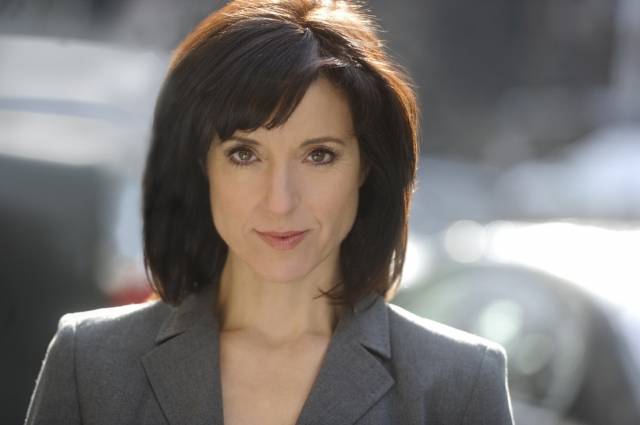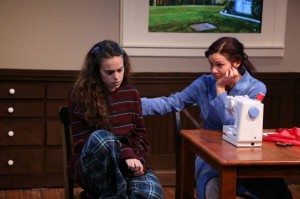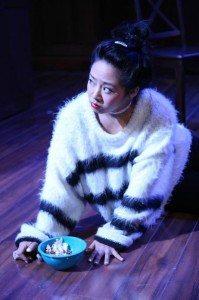
 Maggie Bofill, as she'll tell you, is an actress first. Used to being in the spotlight, it wasn't until recent years that she was pushed to pursue her talents off stage and screen, putting on her first play, Face Cream, in 2009 at Ensemble Studio Theatre's One Act Marathon.
Maggie Bofill, as she'll tell you, is an actress first. Used to being in the spotlight, it wasn't until recent years that she was pushed to pursue her talents off stage and screen, putting on her first play, Face Cream, in 2009 at Ensemble Studio Theatre's One Act Marathon.
Can you talk a little it about how you first got involved with Ensemble Studio Theatre?
Well, Florencia [Lozano], who played the mom, heard there was a deadline for their one act festival in 2009, and she said, “you gotta submit your play, you gotta submit your play.” And I’d never submitted a play before, I mean, other than with [LAByrinth], my theater company. So I submitted it, and they chose it. Then they were like, we have to connect you with a director, this one director is really good, Pam Berlin. And I was like, okay!
So you have a history not only with the theater, but with the director of Winners.
Yeah, she was the first director I worked with at EST. She was the only director I worked with at EST. Well, as a writer.
Okay, digging into the material, I was struck at how real the characters felt. I’m wondering if you could talk a little bit about what your process is for creating a full, nuanced human being when you’re writing your plays?
Oh wow. I think, um… I think a lot of the nuance comes, well, I don’t know how nuanced they are -- you know sometimes ‘nuanced’ means many times, many attempts, many non-nuanced, really bad things that you write over and over. But I think conversation has always been like music to me, and I don’t know if it’s a signature per se, but, it just feels like music. You know? Different characters have different music, and then when people are talking I just hear it. I think I have sort of a motto where, if I’m scared when I’m writing it, that’s probably the better option.
You bring up music, and that’s interesting to me, because I was going to comment on how, with the dialogue as you mention, there are these lows, these quiet moments, and then there are also these tremendous crescendos where everyone is screaming. Did you get lucky finding a cast that cohered so well, that would go there with you, and had a great dynamic, or did you really have to pull it out of them to find that relationship?
I had a great cast of actors who took to it like music, like an instrument. They really did. They helped to make it stronger, and, you know, it does start with the script, cause you’ve gotta follow what’s in front of you, but then you have people who easily hear it and go there, and a director who keeps them in check too.

You mentioned Florencia, have you worked with many members of the cast before this show?
Florencia I’ve known for a long time. When this was just one scene that I read in Stephen Guirgis’ living room for LAByrinth -- I’m a founding member of LAByrinth Theater Company -- and we had “LAByrinth Write Night.” I wrote a scene, and I was feeling like a terrible writer, like “okay, write what you know, write what you know.” And I was like, well, I’m kind of insane about my pots and pans -- my nonstick pots. So the first scene [of Winners] came out, and that one hasn’t changed. [Florencia] read it, and after the scene, people were like “okay, you have to continue writing.” Plus I’ve been in stuff that she’s written, and we’ve acted together. We’ve just known each other a long time.
In a lot of ways the play is about a pretty average family. I’m wondering how you came to this as your subject material? Also, I think as an audience member, you find that there’s a bit in each family member to relate to. Where do you fit in? What personal experiences do you bring to writing this?
The mom is definitely similar to my mom. In fact my cousin -- my mom was my cousin’s godmother as well as her aunt -- she came to the play, and at intermission… I’ve never had a family member fly in for a play before, so she showed up, and it was like, woah… but, my mother has passed away, and she was very close to my mom, and at intermission, she was like, “Oh my god. Madrina. That’s madrina!” [‘Madrina’ is Spanish for godmother.] I was like, I know. I know. And she said, “and that’s your dad!” And I said, "I know, I know." So it’s a very exciting family, but there was a lot of love. I think because we loved each other, we felt free to scream the hell out of each other (laughs).
But where am I in there? Well, it’s more based on, not my family per se, but some sort of interactions... And, it’s funny because I’m Cuban, but the play sort of smacks of Americana in a way, and I think I sort of felt like, families are families, you know? And financial crunch does things to people that might not normally happen. You know, makes them do things they might not normally do.
On the program, Winners is billed as a comedy, but there were also some really sad parts and some difficult parts, and I wonder how, as a writer, you find that balance between humor and the less humorous moments - the fights.
Well, I don’t… you know, it’s tough. This play is a tricky one, tonally. It’s a comedy, but not. I think for me humor is the best way to open up the heart. When you’re laughing your defenses are down and you’re ready to hear what comes next. So there’s something about, as cliché as that sounds, being able to laugh and then cry sort of at the same time. Nothing is too precious, and because you take that attitude that nothing is too precious, the serious stuff sort of lands a bit more. Cause it kind of feels a little more real.
The set is so realistic, and in a way the play is so realistic, but there are also surreal moments - the transitions between scenes, the fact that the dog and the cat are played by people… in this really humorous way. I’m wondering how you set out to write the play from this perspective?
Well, you know I never even thought about the set. I thought, “we could have a house like August: Osage County did!” (laughs) In my head that’s what I saw, I saw a house chopped in half where we just moved up and down. I don’t know what world I was living in. But uh, I don’t worry about the set in a way. There’s a part of me that, like, I love the fact that they did make it so realistic. Just because, talk about production value, I was like “really, for me!?” But part of me would have been -- actually in the beginning I was like actually it’s okay if we have a table and four chairs and just pretend like we’re in different places. In my mind, I almost could have done it on a set drawn with markers. Just cause, I felt like the story was strong enough that it was okay to have something like that. But that’s also because it is a naturalistic story.

Can you talk a little bit about your choice to have the dog and cat played by humans and enter the play in the way they do?
Oh man, they steal the show. I wrote the play so I could take those characters out. First of all, I thought, no one is going to do a play with eight characters. And second of all, they’re animals. But that was sort of a very small part of my brain, because I think I think practically, but… not. They quickly became a part of the story, because a lot of times in families, animals are a big part. Especially when there are kids. Or even when there’s not a kid. Animals serve a purpose. There was no way I was gonna have somebody in a cat suit. I just never thought it would be anything different, but then totally, they won. It’s the chaos, it’s the chaos of family. The chaos and the surreality of family too. Like, how many times has something happened in my family, where I’m like, “if I were to write this no one would believe it.”
Is there anything else you would like our readers to know?
Well, I mean it just wouldn’t have been possible without Radio Drama or EST. The fact that they chose it, I just, I feel like I won the lotto. And EST, they’re the real deal. They are process oriented, and it’s all about the process. Yeah, they put up a good product, but they do what they say. They support the writer and really look at the process. And they aren’t scared. They have no fear. Like, they had more confidence in me than I had in me, and that’s huge. Really huge.
Winners is on stage through February 8th at the Ensemble Studio Theatre.